- Home
- Alex Segura
Dangerous Ends Page 2
Dangerous Ends Read online
Page 2
“It was self-defense,” Pete said flatly.
Wintle let out a slow, humorless laugh. “Sure as hell was,” he said. “You got that guy good, man. Wish I could have seen his face.”
He tapped his pen on his clipboard twice and nodded to them.
“Funny you’re coming to see Varela. Guy never gets visitors,” Wintle said. “But Inmate Varela is at number seven.”
“Number seven?” Pete said.
He felt Kathy grip his elbow and whisper into his ear.
“Let’s go.”
THE VARELA case had it all: murder, alleged police corruption, and mysterious, half-baked theories that pointed toward Varela’s possible innocence. During the trial, his defense team had tried to convince the jury that two bloodthirsty thugs had murdered Carmen Varela. They had stormed the Varela home, overpowered Gaspar, and murdered Carmen, leaving Gaspar unconscious but alive.
The defense’s story hinged on one Janette Ledesma—dubbed “the woman in the orange dress” by the press. Gaspar told the police that he saw a woman in an orange dress in the house immediately after the attack, which was also supported by an officer who responded to Gaspar’s 911 call. The officer confirmed a woman fitting Ledesma’s description was seen leaving the scene, but the officer could not say he saw her in the house—a point the prosecution focused on during the trial. Ledesma did, in fact, work as a home health aide in the Varelas’s neighborhood.
Later, Ledesma told the police that she’d seen two men, clad all in black, rush out of the Varela home. But instead of trying to help the Varelas until the police came, Ledesma said she’d gotten scared that the assailants would return, and had fled the murder scene. It was only upon hearing the Varela story on the news a few days later that she decided to come forward.
Unfortunately for Gaspar Varela’s defense, Ledesma collapsed on the stand, recanting her initial statements while getting picked apart by prosecutor Calvin Whitelaw—who hammered Ledesma on her checkered criminal history, drug arrests, and numerous inconsistencies between her testimony and the various statements she had made to the police. Instead of saving the case for Varela, her testimony all but destroyed it. Though the physical evidence against Varela had been minimal—some fibers from his wife’s nightgown were found on his body, and his blood seemed to have intermingled with hers in a way that pointed to a struggle—Whitelaw capitalized on the defense’s bungle with Ledesma, and painted Varela as a detached husband and father with a temper who was more interested in enjoying the Miami nightlife than working on his marriage. Whitelaw also reframed the defense’s key evidence—Varela’s bruised body, which was meant to show that Varela was a victim as well—as proof that Carmen Varela had tried to fight off her husband as he stabbed her. The fact that Carmen’s brother, Juan Carlos Maldonado, owner of GrocerEase, a failed e-grocery app and website service, testified against Gaspar didn’t help matters. Maldonado claimed his brother-in-law was not only a womanizer and prone to violent outbursts, but also a pill-head who popped Quaaludes like candy.
The defense tried to introduce evidence that supported the home invasion theory—an unidentified thumbprint, unaccounted-for shoeprints, and the absence of a murder weapon—but these facts were just white noise to a jury still reeling from the one-two punch of Ledesma’s and Maldonado’s testimonies. It didn’t help that the judge clearly favored the more seasoned and smooth Whitelaw, a veteran of high-profile Miami murder cases, over Varela’s inexperienced and bargain bin attorney, Jackie Cruz. With his shock of slicked-back white hair, athletic build, and penchant for lyrical oration, Whitelaw was the rare combination of spectacle and substance. By the end of the trial, it was clear to anyone watching that he’d won over the mostly white jury. Cruz, for the most part, held her own. But her lack of big trial experience showed at key moments, and she was unable to recover from the collapse of Ledesma’s testimony. After only a few hours of deliberation, the jury found Gaspar Varela guilty of first-degree murder.
Since then, Varela had exhausted his appeals and built a cult-like following of supporters and zealots outside of his prison cell—led by his own daughter, who had dedicated her adult life to proving her father’s innocence. It was Maya who had approached Kathy with the offer: Write a book with my father. Explain his side of the story. Help an innocent man go free.
The opportunity was perfect for Kathy—a newspaper brat, who’d most recently worked as the daily news columnist for Pete’s old paper, the Miami Times. The job had once belonged to her father, Chaz Bentley, a legendary Miami reporter and unrepentant drunk. Pete had first met Chaz a few years back, at the tail end of Chaz’s own gin-soaked journalism career. Chaz had sought Pete out in an effort to find Kathy, who had been kidnapped by one of the deadliest mob killers in Miami history. Pete managed to locate Kathy, but Chaz wasn’t as lucky, ending up on the wrong side of the killer’s silenced pistol.
Maya had told Kathy that she hoped the book would help exonerate her father in the eyes of the public and media. But she also hoped that, by reviewing the existing evidence, they’d find something new that might merit another trial, and another chance for her father’s freedom. That was where Pete came in. Having exhausted their appeals, the Varela camp’s last chance was to unearth significant and previously unseen evidence that would open the door for them to file a post-conviction motion that would allow a judge to consider a new trial for Varela—no mean feat.
After a few hours of hemming and hawing, Pete relented—he would meet Varela, get a feel for the situation, and decide if he was in. This was enough for Kathy, who had already processed the paperwork they’d need in order to visit Varela the following morning.
“I STILL haven’t said yes to working on this,” Pete whispered as they walked through the cramped visitor’s area. Pete saw every kind of encounter in the span of a few feet—the grieving mother, the young wife and child, the fellow gangbanger, and the confused friend. Where did he and Kathy fall? Opportunists? Justice seekers?
Varela was seated on the opposite side of the bulletproof glass at cubicle seven. He looked relaxed and used to the procedure, the telephone that would allow him to talk to Pete and Kathy already at his ear. There were two phones on the opposite side. Varela seemed calm but alert, his eyes scanning them as they sat down. Kathy picked up the phone and waited a second.
“Thanks for coming,” Varela said. His voice was low and smooth. He looked weathered and worn from a decade in prison, but Pete could still see glimpses of the man Varela had been: handsome, well spoken. “I’ve been looking forward to talking this out.”
“Well, that’s good,” Kathy said. “I’m, uh, I’m glad we made it. I assume Maya outlined what we were thinking?”
Varela pursed his lips and let his eyes drift over to Kathy. Kathy was a good-looking woman—fit, blond, and naturally tan from time spent on Miami Beach. In her mid-thirties and real, Kathy had no trouble turning heads in Miami, a town built on fake, well, everything. It’d probably been years since Varela had spoken with an attractive woman who wasn’t a lawyer or a cop.
“Yes, she did,” Varela said. He glanced at Pete for a second. “I’m intrigued by the idea. I think a book can definitely help raise awareness. Lord knows we need it. There’s so much to this case—so much that hasn’t been brought to light in court or in the eyes of the law—it could really help.”
“Of course,” Kathy said. “But I have to be clear about one thing: I can’t promise this book will be a puff piece, or something you can use to prove your innocence. I’m going to do my research, talk to the people involved, and, thanks to the access you’re providing, form my own conclusions.”
Pete tensed up. Kathy had outlined her Varela strategy to him on the ride in, but it felt much more sudden in real time. This was supposed to be the closer. So much for that.
Varela stiffened. Pete couldn’t tell if he was upset. He couldn’t really read him at all. The silence hung over them for a few seconds, like a business meeting reacting to an off-color joke.
“Ar
e you going to introduce your friend?” Varela asked, motioning with his chin to Pete.
“Oh,” Kathy said in relief. “This is Pete. Pete Fernandez. He’s a private detective who will, ideally, help me with the book, like I mentioned. You know, interviewing witnesses, reexamining the case evidence, and—”
“You caught that serial killer,” Varela said. “And the other guy before that—the Silent killer? Silent…?”
“The Silent Death,” Pete said. “That was the guy’s nickname.”
“Right,” Varela said. “I heard about both—even in here. Maya brings me the paper when she can. You’re a brave guy—if the stories are true.”
“Depends on the story,” Pete said. He was trying to be funny, but the joke sounded more defensive than he’d hoped.
Varela nodded and turned his attention back to Kathy. “I’m fine with the idea,” he said. “I get that you have your ethics. But I want you to know I’m innocent. I did not kill my wife. The evidence the state has is weak—a joke. If my idiot lawyer hadn’t put that woman on the stand, we may have won.
“They made me look like a crazy person. A line of psychiatrists said I didn’t have a psychotic bone in my body or a violent temper, but that evidence was disallowed. I had dozens of friends and relatives eager to explain that there was no way I killed my wife. But everything we tried to do was shot down by the judge. The appeals have been even worse.”
Varela let out a long sigh and smiled wryly.
Pete wasn’t convinced. A part of him felt bad for Varela. The idea of being incarcerated for any amount of time for a crime you didn’t commit seemed surreal to him, even though he knew it happened more often than it should. His own dealings with the Miami Police Department had shown him enough corruption to believe it possible. But if Varela was guilty of the crime, he was just getting what he deserved.
Varela seemed to notice the awkward silence.
“So, yes, let’s do this,” he said. “I’m out of options. I hope you and your friend here can discover enough to make a new case.” He looked from Kathy to Pete and then back to Kathy. “Otherwise, I’m going to rot here until I die.”
THEY MADE tentative plans to reconvene with Varela for a more formal interview once they reviewed the case files. But, like most of Miami, they were familiar with the basics of the case already.
The story of Gaspar Varela was a part of Miami lore. Pete had followed the news from the time Varela was found next to his dead wife, through the conviction, and even after, during his initial appeals. Although Varela was dismissive of the physical evidence—and he was right that the case was mostly circumstantial—the jury had connected the dots and found that there was enough to convict him beyond a reasonable doubt. And the appellate courts had upheld Varela’s conviction every time.
Establishing Varela’s motive had been more challenging for the prosecution to prove. Beyond the vague explanation that Varela “had a dangerous temper,” Whitelaw mostly avoided it during the trial. They tried to paint Varela as a drug-fueled party animal looking to escape the constraints of his marriage, growing more desperate as time passed. That, coupled with his volatile temperament, led to the death of Carmen Varela. It was a flimsy motive at best, and one that the prosecution wasn’t able to support very well. From what Pete had gleaned by reading news reports during and after the trial, there were few people who had a genuine dislike for Varela. Still, some cracks appeared after the murder that would come back to haunt Varela’s attempts to point to his sterling character. A woman’s claim she had an affair with Varela drew some tabloid headlines, and there were rumors that Varela was trying to get a lucrative book deal before the verdict was read. Varela also didn’t win any new fans after an awkward, creepy TV talk show appearance that made him seem more cunning and attention-hungry than innocent. These missteps and the prosecution’s intimations of marital discord were just enough to make the jury think that maybe Gaspar Varela wasn’t the nice guy his lawyers made him out to be.
But just because you’re a jerk doesn’t mean you’re a killer, Pete thought.
“What’s going on in that little skull of yours?” Kathy asked as she fumbled through her oversized purse, looking for her car keys. They’d just stepped out into the scorching Miami sun. It was approaching one hundred degrees and Pete felt a sheen of sweat form under his gray polo.
“Trying to wrap my head around this thing,” Pete said. “I’m curious to hear Varela’s take on what happened, when we have more time with him. How do you feel about it?”
“I’m leaning toward guilty,” Kathy said, finally discovering the collection of keys at the bottom of her bag. She yanked them out triumphantly before turning to Pete. “But I do believe his case was botched from the get-go.”
“Oh?”
“I don’t know for sure,” she said. “Although the ‘crazy thugs’ story never rang true to me, there’s more to it, guilty or not.”
Pete nodded. He wasn’t certain of a lot of things about the case—including whether he wanted to be involved. His life had become fairly mundane and he’d gotten used to it.
As they made their way down the long walkway that led visitors to and from the prison, Pete noticed a figure approaching them. It was hard to make out much with the blazing sun in his eyes, but he could tell it was a woman. She seemed to be waving at them.
“You expecting someone?” Pete asked.
“I think it might be our benefactor,” Kathy said.
As the woman got closer, Pete noticed she was young—late twenties—with dark brown hair, and attractive. She was carrying a large canvas bag over her shoulder, which appeared to be full of books and manila folders stuffed with papers. She reached them about halfway down the walkway and extended her hand to Kathy.
“Kathy, hi, so glad to see you here,” she said.
“Glad to be here,” Kathy said, not bothering to introduce Pete. “The talk went well. I think he’s on board. We’ll circle back to him soon for a longer chat.”
“Excellent,” the woman said. Her smile looked natural and soft—the kind one reserved for old friends. “That’s great. What a relief. I know he can be a tough guy to talk to.”
Pete cleared his throat.
“Oh, right, I forgot you haven’t met,” Kathy said. “Maya, this is Pete Fernandez, the detective I mentioned to you. Pete, this is Maya Varela, Gaspar’s daughter. She’s the one who reached out to me—us—about the book.”
Pete tried to give her his best I’m-not-a-creep smile and moved to shake her hand. She sidestepped him and went for a hug. Pete returned the embrace with surprise.
“Nice to meet you, Pete,” she said, her breath hot on his neck. She let go and took a step back. “Sorry—I’m a hugger.” She laughed. “And I’m really glad my dad is on board with this. I think it’ll help the case so much. I can’t even begin to thank you.”
Pete felt his face getting warm. He managed to get out a quick, “Nice to meet you too.”
A few seconds passed. Finally, Maya shrugged and took another step toward the prison.
“Well, I have to talk to my dad,” she said, still smiling. “We need to go over what his options are.”
“For what?” Pete asked.
“For his motion,” Kathy said. “Right?”
“Yes, right.” Maya nodded. Her shoulders sank a bit. “The truth is he doesn’t have many options. He’s burned through all his appeals, so the only thing that can save him is another trial. That’s part of the reason we’re working with you guys. We need some kind of information no one was aware of that proves he’s innocent.”
“We’re going to get started right away,” Kathy said. “I sent you our payment info, so let me know if that’s okay.”
“Oh, I’m sure it’s all fine,” Maya said. “I’ll send over the memo—recapping all the discovery stuff—to you tonight. Once you talk to dad’s old attorney, she can get you all the files from the original trial. I’ve already let her know you’ll be reaching out.”
&nb
sp; Her eyes had gone distant, as if she had just now realized the enormity of their task. Pete felt bad for her. She looked at him and a brief smile returned to her face. Pete nodded. He wasn’t sure what else to do.
Havana, Cuba
February 23, 1959
DIEGO FERNANDEZ waited ten minutes. It took that long for his breathing to return to normal, and to feel like he could get up and support his own weight. He stood and peeked out the window of his study. The street seemed clear.
He walked to the master bedroom and searched under the bed—his body flat on the floor like a fallen sheet of paper, his arm reached for the dark bag. He tugged at the strap and dragged it out into the room. He didn’t bother to check what was inside, instead hoisting the heavy knapsack over his shoulder. He had to hurry. The time for subterfuge had passed—he had his wits, a bit of luck, and his prayers. Those things would save him from being the next name added to Dreke’s kill list.
Diego hurried down the house’s main hallway. His head throbbed, bubbling over like a pot left on the stove too long, overcome with worries and fears he’d only experienced in nightmares and his darkest moments. When would he see his wife and son again? What now? He couldn’t dwell. He had to run.
The bag was heavy, making his run more intense and taxing. He was wheezing and gasping for breath. Diego was a strong man. He tried to stay in shape. No, this wasn’t physical exhaustion. He was scared.
He paused at the front door of his large, four-bedroom house, the one he’d never imagined they’d afford, much less live in for a decade—the house where his young son had been raised. He knew a bullet could be waiting for him when he opened the door and stepped outside. He rested one hand on the doorknob. With the other hand, he opened the curtains that covered the narrow window to the left of the front door.
It was dark outside. He wouldn’t be able to see them until they could see him.
Diego grabbed the coatrack next to the door and put one of his favorite hats on top. He draped his coat around it. In the dim light of the house, it didn’t resemble anything human, but it wouldn’t have to for very long. He crouched down, crawled to the door, and put his hand back on the doorknob. In one movement, he swung open the door and moved out of the way, thrusting the coatrack out into the moonlight like a bedraggled scarecrow.

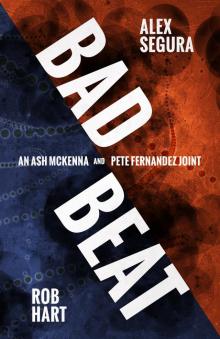 Bad Beat
Bad Beat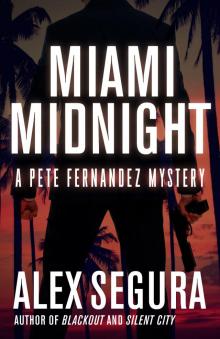 Miami Midnight
Miami Midnight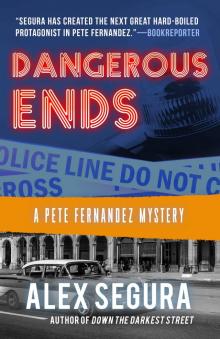 Dangerous Ends
Dangerous Ends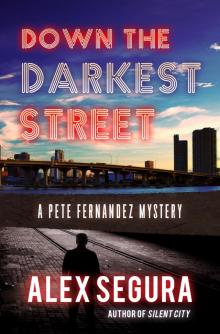 Down the Darkest Street
Down the Darkest Street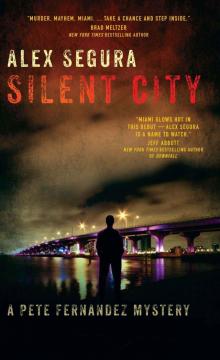 Silent City
Silent City